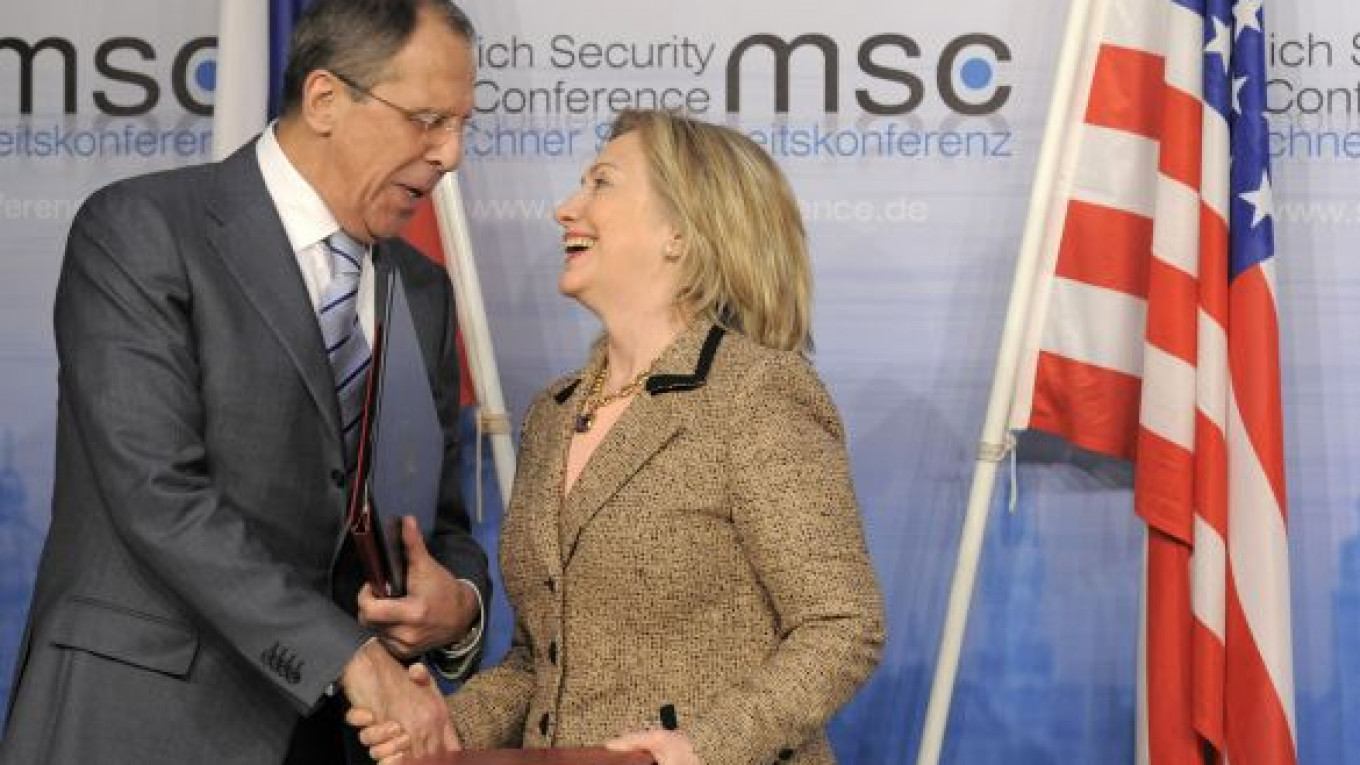MUNICH — The United States and Russia formally inaugurated their New START nuclear arms treaty on Saturday, capping two years of work to "reset" the sometimes strained ties between the former Cold War enemies.
U.S. Secretary of State Hillary Clinton and Russian Foreign Minister Sergei Lavrov exchanged the final New START documents at a Munich security conference, where two years ago U.S. Vice President Joe Biden started the Obama administration's push for better relations with Moscow.
"Two years ago we all laughed about the translation of the ceremonial 'reset' button I gave to the Foreign Minister," Clinton said, referring to a diplomatic gaffe in which she presented Lavrov with an oversized button on which "reset" was mistranslated into the Russian for "overcharge."
"But when it came to the translation that mattered most, we turned words into action to reach a milestone in our strategic partnership."
President Dmitry Medvedev and U.S. President Barack Obama signed the deal in April after a year of tough negotiations, committing the world's top two nuclear powers gradually to reduce their atomic arsenals.
The New START treaty has been at the center of Washington's effort to improve ties with Moscow, which hit a low with Russia's 2008 war against pro-Western Georgia and were further strained by disagreements on trade and U.S. concerns over Russia's record on human rights and free speech.
U.S. officials say the "reset" has delivered results on a number of fronts including efforts to rein in the nuclear ambitions of Iran and North Korea, cooperation on the halting Middle East peace process and growing ties between Russia and NATO.
The New START treaty itself is also seen as an important step toward Obama's goal of nuclear disarmament.
Obama faced down sharp objections from some Republican senators, who said the new treaty gave too much away, to win Senate ratification late last year in a major political victory.
The New START treaty commits the two nations, with 95 percent of the world's nuclear weapons, to ceilings of 1,550 deployed strategic warheads in seven years, up to 30 percent lower than in the 2002 Moscow treaty.
It will limit each side to 700 deployed strategic missiles and bombers and establish verification rules, absent since the U.S.-Soviet Strategic Arms Reduction Treaty (START I) expired in 2009, enabling them to keep tabs on each other's arsenals.
Now the treaty has taken effect, the two nations will begin exchanging information about the status of their nuclear forces and, within weeks, hold the first on-site inspections of each other's nuclear arsenals in nearly two years.
The United States and Russia have already signaled differences over further cuts, including on tactical nuclear weapons that many analysts regard as a more immediate danger.
A Message from The Moscow Times:
Dear readers,
We are facing unprecedented challenges. Russia's Prosecutor General's Office has designated The Moscow Times as an "undesirable" organization, criminalizing our work and putting our staff at risk of prosecution. This follows our earlier unjust labeling as a "foreign agent."
These actions are direct attempts to silence independent journalism in Russia. The authorities claim our work "discredits the decisions of the Russian leadership." We see things differently: we strive to provide accurate, unbiased reporting on Russia.
We, the journalists of The Moscow Times, refuse to be silenced. But to continue our work, we need your help.
Your support, no matter how small, makes a world of difference. If you can, please support us monthly starting from just $2. It's quick to set up, and every contribution makes a significant impact.
By supporting The Moscow Times, you're defending open, independent journalism in the face of repression. Thank you for standing with us.
Remind me later.






